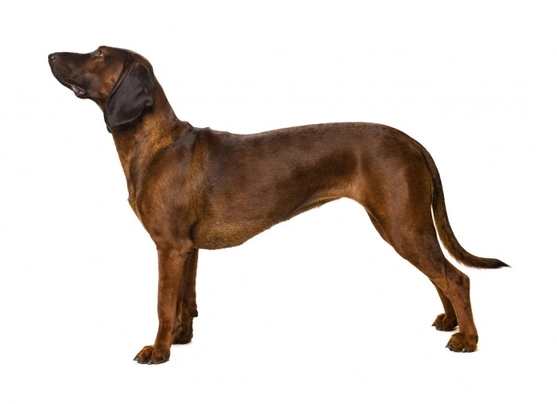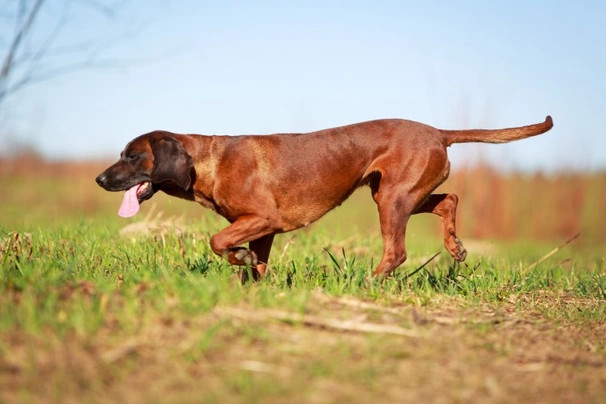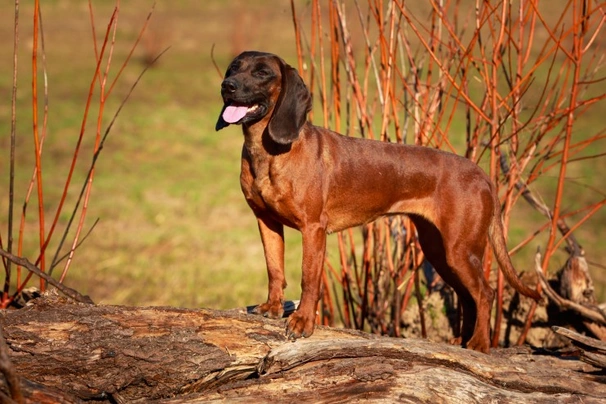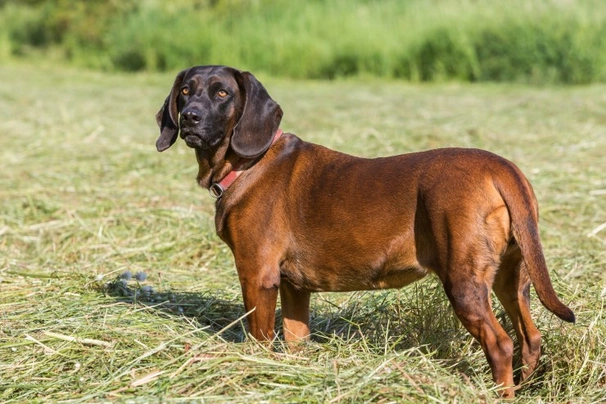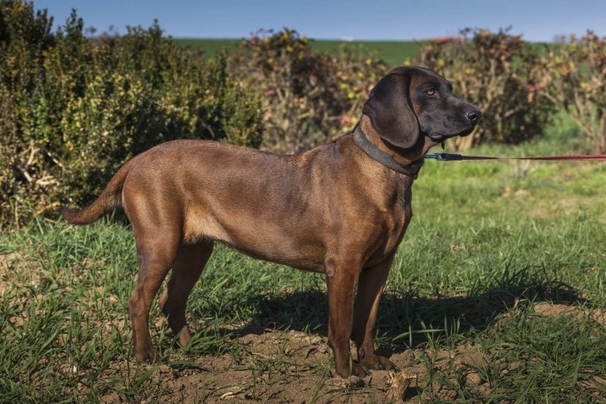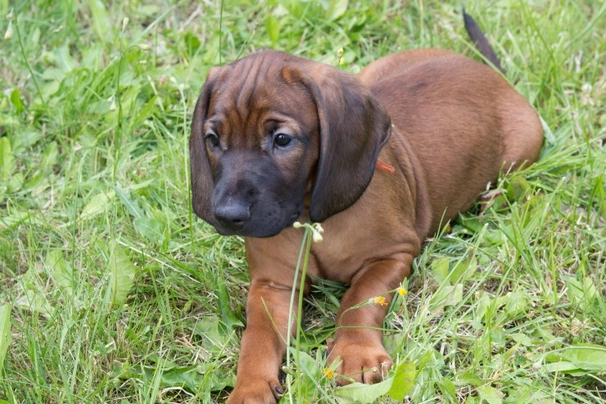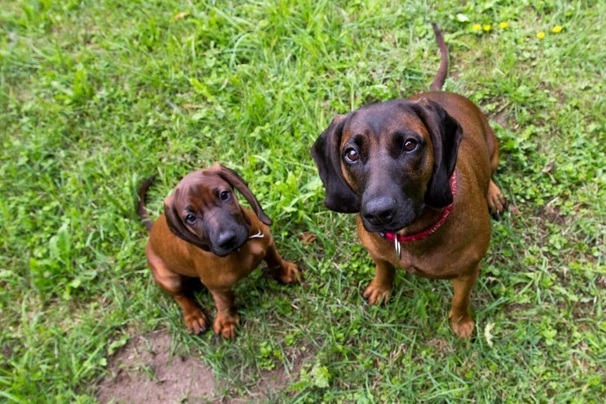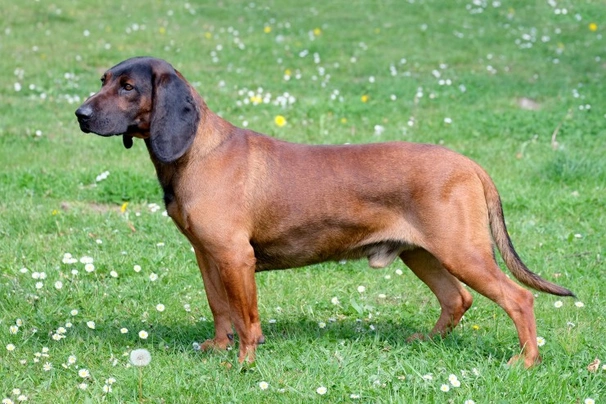Bavarian Mountain Hound
Pros
Cons
Introduction of the Bavarian Mountain Hound
Bavarian Mountain Hounds are elegant dogs that hail from Germany where they have always been highly prized for their scenting abilities in the field. The breed is relatively unknown in the UK but these charming hounds are popular in many regions of Europe which includes Slovakia and the Czech Republic thanks to their loyal and affectionate natures as well as for their hunting skills. The breed is frequently referred to as the Bayrischer Gebirgsschweishund more especially in their native Germany.
Bavarian Mountain Hounds are slowly but surely gaining a fanbase in the UK and for good reason. Not only are these medium sized dogs very handsome but they make wonderfully trustworthy family pets although anyone wanting share a home with a BMH would need to register their interest with breeders and go on a waiting list for the pleasure of doing so.
History of the Bavarian Mountain Hound
The Bavarian Mountain Hound was originally bred in southern Germany to track large wounded prey which they were trained to do while being held on a lead. Known as the Bayrischer Gebirgsschweishund the breed was first developed late in the 19th Century when breeders decided to cross the Hanovarian Hound with Red Mountain Hounds. Through careful and selective breeding they managed to produce a lighter and therefore more agile hunting dog that was capable of working over more challenging mountainous terrains as well as through water. The German breeders were successful and produced lovely looking dogs that soon became known for their loyalty and devotion to their owners. As such the breed was soon highly sought after by hunters thanks to their stamina strength agility and the fact they could work harsh terrains while being held on a lead with no trouble at all.
In 1912 the Bavarian Mountain Hound Club was first established in Germany and some time later the breed was officially recognised by the Kennel Club in 1996 too although even today few well-bred puppies are registered every year. As such anyone wanting to share a home with a Bavarian Mountain Hound would need to register their interest with breeders and be put on rather long waiting lists with the good news being that the wait would be well worth it.
Interesting facts about the breed
- Is the Bavarian Mountain Hound a vulnerable breed? No they are slowly finding a fanbase in the UK although as previously mentioned there tends to be long waiting lists with breeders in the UK because very few puppies are bred and registered with the Kennel Club every year
- The Bavarian Mountain Hound is a relatively new breed only having been developed in the late 19th Century
- Bavarians are renowned for their placid dispositions as well as their high pain threshold
Appearance of the Bavarian Mountain Hound
Height at the withers: Males 47 – 52 cm Females 44 – 48 cm
Average Weight: Males 20 – 25 kg Females 20 – 25 kg
The Bavarian Mountain Hound is a very athletic and elegant well-balanced dog that for a hound is lightly built yet very powerful looking. They are medium sized hounds that boast being slightly longer in the body than they are tall. Their heads are moderately broad with no distinct occiput but a well-defined stop. They have quite short and broad muzzles and boast pendulous moderately thick well pigmented lips. Their noses can be black or dark red in colour and moderate in size with nice open nostrils.
Eyes are large round and medium in size being either dark brown or hazel in colour and dogs always have a keen alert expression in them. The rims around their eyes are nicely pigmented. Ears are heavy and set moderately high on a dog's head having round tips to them. They hang close to the head lying flat. The BMH has a strong jaw with a perfect scissor bite where their upper teeth neatly overlap their lower ones.
Their necks are moderately long and strong with the skin being a little looser on a dog's throat. Their chests are muscular and nicely boned with dogs having well laid back shoulders and straight well-muscled front legs. The BMH has a strong supple back with a nice topline that rises slightly from the wither to the croup. Their ribcage is oval long and deep reaching far back. Their loins are well-muscled broad and short with dogs having nice tucked up bellies.
Hindquarters are strong and well-muscled showing a good amount of bone and strong upper thigh with their lower thing being quite long. Back legs are well muscled and strong. Feet are oval in shape with dogs having tight well-arched toes and well-cushioned pigmented pads. Nails can either be black or horn in colour. Their tail is set high and is moderately long tapering to the tip which dogs carry level or slightly lower than their back.
When it comes to their coat the Bavarian Mountain Hound boasts a dense thick and close moderately harsh coat with the hair being finer on their heads and on their ears. Accepted breed colours for Kennel Club registration are as follows:
- Deer Red
- Deer Red with Black Mask
- Stag Red
- Stag Red with Black Mask
A dog can have black or brindle hairs interspersed throughout their coats and their back and tail is typically a richer colour with their muzzles and ear leathers also being darker than the rest of their body. Dogs are allowed to have a little patch of lighter hair on their chests.
Gait/movement
When a Bavarian Mountain Hound moves they do so with a springy light step covering a lot of ground when they do and showing a good reach from the front and plenty of drive from behind.
Faults
The Kennel Club frowns on any exaggerations or departures from the breed standard and would judge the faults on how much they affect a dog's overall health and wellbeing as well as their ability to perform.
Males should have both testicles fully descended into their scrotums and it is worth noting that a dog can be a little lighter or heavier as well as slightly taller or shorter than set out in the Kennel Club breed standard which is only given as a guideline.
Temperament of the Bavarian Mountain Hound
The Bavarian Mountain Hound is known to be a calm dog and one that becomes devoted to their owner but a little suspicious and way of strangers. However these dogs would rarely show any aggressive behaviour towards people they don't know preferring to keep out of the way. They boast having a natural scenting ability which is why these dogs are so highly prized in their native Bavaria.
With this said these hounds have earned themselves a worldwide reputation for being among the best scenting dogs and the fact they boast a tremendous amount of dedication and stamina to the job they were bred to do. They are extremely loyal hounds and as such they are a great choice as family pets as long as owners have enough time to look after them.
Because they form such a strong bond with their owners these dogs do not like to be left on their own for extended periods of time. As such they are not the best choice for people who spend most of the day out of the house. However they are the perfect family or companion for families where one member of the household usually stays at home whenever everyone else is out.
The Bavarian Mountain Hound is not the best choice for first time owners because they need to be correctly handled and trained. Without the right sort of training these dogs can start to show a more dominant side to their characters which can end up with them being wilful and unruly. It could also lead to a dog developing some destructive behaviours if they are left to their own devices for too long.
They also need to be given a tremendous amount of daily exercise which has to include a lot of mental stimulation for them to be truly happy well-rounded obedient characters. Puppies need to be well socialised from a young age which means introducing them to lots of new situations people and other animals as soon as they have been fully vaccinated.
Are they a good choice for first time owners?
Bavarians not the best choice for first time dog owners because they need to be well socialised trained and handled by people who are familiar with their specific needs bearing in mind that these intelligent hounds can have a stubborn and strong-willed streak in them.
What about prey drive?
A Bavarian Mountain Hound has a very strong prey drive and as such care must be taken as to where and when a dog can run off the lead more especially if there is wildlife and livestock around.
What about playfulness?
Bavarians have a very playful and rather mischievous side to their natures. They love to entertain while at the same time be entertained and being so clever they quickly learn what pleases an owner and how to get their own way.
What about adaptability?
The Bavarian Mountain Hound is better suited to households with large very secure back gardens that a dog can safely roam in whenever they can. This allows them to let off steam which a BMH loves to do as often as possible. They are not a good choice for anyone living in an apartment for this reason.
What about separation anxiety?
Bavarian Mountain Hounds form very strong ties with their families and are never very happy when they find themselves left on their own for any amount of time. They are better suited to people who either work from home or in households where one person stays at home when everyone else is out so they are never alone for any length of time which could see a dog suffering from separation anxiety. This can lead to them being destructive around the home which is a dog's way of relieving any stress they are feeling and a way to keep themselves entertained which could include incessant barking.
What about excessive barking?
Some Bavarians like the sound of their own voices a little too much which is something that needs to be gently nipped in the bud when a dog is still young being careful not to frighten them. Others will only bark when there are strangers about or when something they don't like is going on in their surroundings and like many other hounds they have a very distinct voice.
Do Bavarian Mountain Hounds like water?
Most BMHs love swimming and will take to the water whenever they can more especially when the weather is hot. However if anyone who owns a dog that does not like water should never force them to go in because it would just end up scaring them. With this said care should always be taken when walking a Bavarian Mountain Hound off the lead anywhere near more dangerous watercourses just in case a dog decides to leap in and then needs rescuing because they cannot get out of the water on their own.
Are Bavarian Mountain Hounds good watchdogs?
Because Bavarian Mountain Hounds are naturally wary of strangers and people they don't already know they do make good watchdogs although they would rarely show any sort of aggressive behaviour. With this said they are not good "guard dogs" preferring to keep their distance rather than be confrontational.
Intelligence / Trainability of the Bavarian Mountain Hound
The Bavarian Mountain Hounds is very intelligent and likes to please which means in the right hands and when given the right sort of guidance and training they are easily trained. The key to successfully training one of these hounds is to always be fair and consistent. These hounds are never happier than when they know their place in a pack and when they can look up to someone for direction which is why they are not the best choice for first time owners but a great choice for people who are familiar with this type of intelligent hound.
Like all puppies a Bavarian Mountain Hound puppy is incredibly cute and it is all too easy to spoil them when they first arrive in their new homes. However once a puppy is nicely settled in owners should start out as they mean to go on which means laying down rules and boundaries so that a puppy understands what is expected of them. It also helps establish a pecking order and who is the alpha dog in a household. As such the first commands a BMH puppy should be taught are as follows:
- Come
- Sit
- Stay
- Heel
- Quiet
- Leave it
- Down
- Bed
Children and other
The Bavarian Mountain Hound is generally good around children and enjoys living in a family environment. However just like with other breeds any interaction between a dog and children should be supervised by an adult to make sure play time does not get too boisterous.
Care has to be taken when one of these hounds is around any smaller pets because their strong hunting instinct might just get the better of them. If well socialised from a young age these hounds can be good around other dogs but unlike many other hound breeds they can be "off" around other dogs which is why they need to be well socialised from a young age. Care should always be taken when they are around smaller animals and pets which includes
Health of the Bavarian Mountain Hound
The average life expectancy of a Bavarian Mountain Hound is between 10 and 12 years when properly cared for and fed an appropriate good quality diet to suit their ages.
These hounds are known to be healthy hardy dogs that don't suffer from the many hereditary and congenital health issues that seem to plague many other pure breeds. With this said if you are hoping to share your home with one of these elegant and lively hounds there are a few health concerns that are worth knowing about which includes the following:
- Hip Dysplasia- dogs should be hip scored
- Epilepsy
- Otitis externa
- Entropion
What about vaccinations?
BMH puppies would have been given their initial vaccinations before being sold but it is up to their new owners to make sure they have their follow-up shots in a timely manner with the vaccination schedule for puppies being as follows:
- 10 -12 weeks old bearing in mind that a puppy would not have full protection straight away but would be fully protected 2 weeks after they have had their second vaccination
There has been a lot of discussion about the need for dogs to have boosters. As such it's best to talk to a vet before making a final decision on whether a dog should continue to have annual vaccinations which are known as boosters.
What about spaying and neutering?
A lot of vets these days recommend waiting until dogs are slightly older before spaying and neutering them which means they are more mature before undergoing the procedures. As such they advise neutering males and spaying females when they are between the ages of 6 to 9 months old and sometimes even when a dog is 12 months old.
Other vets recommend spaying and neutering dogs when they are 6 months old but never any earlier unless for medical reasons. Wtih this said many breeds are different and it is always advisable to discuss things with a vet and then follow their advice on when a dog should be spayed or neutered.
What about obesity problems?
Like other breeds a BMH can gain weight after they have been spayed or neutered and it's important to keep an eye on a dog's waistline just in case they do. If a dog starts to put on weight it's important to adjust their daily calorie intake and to up the amount of exercise they are given. Older dogs too are more prone to gaining weight and again it's essential they be fed and exercised accordingly because obesity can shorten a dog's life by several years. The reason being that it puts a lot of extra strain on a dog's internal organs including the heart which could prove fatal.
What about allergies?
Some Bavarians are prone to suffering from allergies and it's important for a dog to see a vet sooner rather than later if one flares up. Allergies can be notoriously hard to clear up and finding the triggers can be challenging. With this said a vet would be able to make a dog with an allergy more comfortable while they try to find out the triggers which could include the following:
- Certain dog foods that contain high levels of grains and other cereal-type fillers
- Airborne pollens
- Dust mites
- Environment
- Flea and tick bites
- Chemicals found in everyday household cleaning products
Participating in health schemes
All responsible Bavarian Mountain Hound breeders would ensure that their stud dogs are tested for known hereditary and congenital health issues known to affect the breed by using the following schemes:
- BVA/KC Hip Dysplasia Scheme
- Breed Club aptitude test
What about breed specific breeding restrictions?
Apart from the standard breeding restrictions for all Kennel Club recognised breeds there are no other breed specific breeding restrictions in place for the Bavarian Mountain Hound.
What about Assured Breeder Requirements?
It is mandatory for all Kennel Club Assured Breeders to use the following test on their dogs and all other breeders are strongly advised to follow suit:
The Kennel Club also strongly recommends that all breeders use the following tests on their dogs before breeding from them:
- Breed Club aptitude test
- Bitches are not to produce a litter when they are under the age of 2
Caring for the Bavarian Mountain Hound
BMH puppies are boisterous and full of life which means it's essential for homes and gardens to be puppy-proofed well in advance of their arrival. A responsible breeder would have well socialised their puppies which always leads to more outgoing confident and friendly dogs right from the word go. With this said any puppy is going to feel vulnerable when they leave their mother and littermates which must be taken into account. The longer a puppy can remain with their mother the better although it should never be for too long either.
It's best to pick a puppy up when people are going to be around for the first week or so which is the time needed for a puppy to settle in. Puppy-proofing the home and garden means putting away any tools and other implements that a boisterous puppy might injure themselves on. Electric wires and cables must be put out of their reach because puppies love chewing on things. Toxic plants should be removed from flowerbeds and the home too.
Puppies need to sleep a lot to grow and develop as they should which means setting up a quiet area that's not too out of the way means they can retreat to it when they want to nap and it's important not to disturb them when they are sleeping. It's also a good idea to keep "playtime" nice and calm inside the house and to have a more active "playtime" outside in the garden which means puppies quickly learn to be less boisterous when they are inside.
The documentation a breeder provides for a puppy must have all the details of their worming date and the product used as well as the information relating to their microchip. It is essential for puppies to be wormed again keeping to a schedule which is as follows:
- Puppies should be wormed at 6 months old
- They need to be wormed again when they are 8 months old
- Puppies should be wormed when they are 10 months old
- They need to be wormed when they are 12 months old
Things you'll need for your puppy
There are certain items that new owners need to already have in the home prior to bringing a new puppy home. It's often a good idea to restrict how much space a puppy plays in more especially when you can't keep an eye on what they get up to bearing in mind that puppies are often quite boisterous which means investing in puppy gates or a large enough playpen that allows a puppy the room to express themselves while keeping them safe too. The items needed are therefore as follows:
- Good quality puppy or baby gates to fit on doors
- A good well-made playpen that's large enough for a puppy to play in so they can really express themselves as puppies like to do
- Lots of well-made toys which must include good quality chews suitable for puppies to gnaw on bearing in mind that a puppy will start teething anything from when they are 3 to 8 months old
- Good quality feed and water bowls which ideally should be ceramic rather than plastic or metal
- A grooming glove
- A slicker brush or soft bristle brush
- Dog specific toothpaste and a toothbrush
- Scissors with rounded ends
- Nail clippers
- Puppy shampoo and conditioner which must be specifically formulated for use on dogs
- A well-made dog collar or harness
- A couple of strong dog leads
- A well-made dog bed that's not too small or too big
- A well-made dog crate for use in the car and in the home that's large enough for a puppy to move around in
- Baby blankets to put in your puppy's crate and in their beds for when they want to nap or go to sleep at night
Keeping the noise down
All puppies are sensitive to noise including BMH puppies. It's important to keep the noise levels down when a new puppy arrives in the home. TVs and music should not be played too loud which could end up stressing a small puppy out.
Keeping vet appointments
As previously mentioned BMH puppies would have been given their first vaccinations by the breeders but they must have their follow up shots which is up to their new owners to organise. The vaccination schedule for puppies is as follows:
- 10 -12 weeks old bearing in mind that a puppy would not have full protection straight away but would only be fully protected 2 weeks after they have had their second vaccination
When it comes to boosters it's best to discuss these with a vet because there is a lot of debate about whether a dog really needs them after a certain time. However if a dog ever needed to go into kennels their vaccinations would need to be fully up to date.
What about older Bavarian Mountain Hound when they reach their senior years?
Older Bavarians need lots of special care because as they reach their golden years they are more at risk of developing certain health concerns. Physically a dog's muzzle may start to go grey but there will be other noticeable changes too which includes the following:
- Coats become coarser
- A loss of muscle tone
- Bavarians can either become overweight or underweight
- They have reduced strength and stamina
- Older dogs have difficulty regulating their body temperature
- They often develop arthritis
- Immune systems do not work as efficiently as they once did which means dogs are more susceptible to infections
Older dogs change mentally too which means their response time tends to be slower as such they develop the following:
- They respond less to external stimuli due to impaired vision or hearing
- They tend to be a little pickier about their food
- They have a lower pain threshold
- Become intolerant of any change
- Often an older dog can feel disorientated
Living with a Bavarian Mountain Hound in their golden years means taking on a few more responsibilities but these are easily managed and should include taking a look at their diet the amount of exercise they are given how often their dog beds need changing and keeping an eye on the condition of their teeth.
Older Bavarians need to be fed a good quality diet that meets their needs at this stage of their lives all the while keeping a close eye on a dog's weight. A rough feeding guide for older dogs is as follows bearing in mind they should be fed highly digestible food that does not contain any additives:
- Protein content should be anything from 14 – 21%
- Fat content should be less than 10%
- Fibre content should be less than 4%
- Calcium content should be 0.5 – 0.8%
- Phosphorous content should be 0.4 – 0.7%
- Sodium content should be 0.2 – 0.4%
Older dogs don't need to be given the same amount of daily exercise as a younger dog but they still need the right amount of physical activity to maintain muscle tone and to prevent a dog from putting on too much weight. All dogs need access to fresh clean water and this is especially true of older dogs when they reach their golden years because they are more at risk of developing kidney disorders.
Grooming of the Bavarian Mountain Hound
These hounds boast lovely short and glossy coats that lie close to their body which in short means they are low maintenance on the grooming front. A weekly brush and a daily wipe over with a mitt is all it takes to keep their coats gleaming and in good condition.
It's also important to keep an eye on a dog's ears and to make sure there is no build up wax which could provide the perfect environment for an infection to take hold. Ear infections can be hard to clear up so prevention is a lot easier than cure.
Exercise of the Bavarian Mountain Hound
The Bavarian Mountain Hound is a lively energetic and intelligent character and as such they require a heap of daily exercise and mental stimulation. They need to be given a minimum of 2 hours a day and this needs to be vigorous exercise that includes a ton of mental stimulation off the lead ideally playing lots of interactive games. These hounds also enjoy being allowed to roam around a secure back garden as often as they can so they can really let off steam and expend any pent up energy. However the fencing in a garden has to be very secure to keep these hounds in.
Feeding of the Bavarian Mountain Hound
If you get a Bavarian Mountain Hound puppy from a breeder they would give you a feeding schedule and it's important to stick to the same routine feeding the same puppy food to avoid any tummy upsets. You can change a puppy's diet but this needs to be done very gradually always making sure they don't develop any digestive upsets and if they do it's best to put them back on their original diet and to discuss things with the vet before attempting to change it again.
Older dogs are not known to be fussy or finicky eaters but this does not mean you can feed them a lower quality diet. It's best to feed a mature dog twice a day once in the morning and then again in the evening making sure it's good quality food that meets all their nutritional requirements. It's also important that dogs be given the right amount of exercise so they burn off any excess calories or they might gain too much weight which can lead to all sorts of health issues. Obesity can shorten a dog's life by several years so it's important to keep an eye on their waistline from the word go.
F_eeding guide for a Bavarian Mountain Hound puppy_
Puppies need to be fed a highly nutritious good quality diet for them to develop and grow as they should. As a rough guide a BMH puppy can be fed the following amounts every day making sure their meals are evenly spread out throughout the day and it's best to feed them 3 or 4 times a day:
- 2 months old - 191g to 258g depending on puppy's build
- 3 months old - 223g to 312g depending on puppy's build
- 4 months old - 239g to 338g depending on puppy's build
- 5 months old - 243g to 359g depending on puppy's build
- 6 months old - 243g to 381g depending on puppy's build
- 8 months old - 211g to 345g depending on puppy's build
- 10 months old - 177g to 281g depending on puppy's build
Once a puppy is 13 months old they can be fed adult dog foo
Feeding guide for an adult Bavarian Mountain Hound
Once fully mature an adult Bavarian Mountain Hound should be fed a good quality diet to ensure their continued good health. As a rough guide an adult Bavarian can be fed the following amounts every day:
- Dogs weighing 20 kg can be fed 215g to 273g depending on activity
- Dogs weighing 25 kg can be fed 260g to 339g depending on activity
Bavarian Mountain Hound price
If you are looking to buy a Bavarian Mountain Hound you may need to accept being put on a very long waiting list if you can find a breeder who has produced any pedigree puppies that is. For the moment it is hard to provide a price guide for a BMH puppy simply because they are so hard to find here in the UK. The cost of insuring a male 3-year-old BMH in northern England would be £73.21 a month for basic cover but for a lifetime policy this would set you back £132.98 a month (quote as of February 2018). When insurance companies calculate a pet's premium they factor several things which includes where you live in the UK and a dog's age and whether they have been neutered or spayed amongst other things.
When it comes to food costs you need to buy the best quality food whether wet or dry to feed your dog throughout their lives making sure it suits the different stages of their lives. This would set you back between £60 - £70 a month. On top of this you would need to factor in veterinary costs if you want to share your home with a Bavarian Mountain Hound and this includes their initial vaccinations their annual boosters the cost of neutering or spaying your dog when the time is right and then their yearly health checks all of which quickly adds up to over a £1000 a year.
As a rough guide the average cost to keep and care for a Bavarian Mountain Hound would be between £150 to £190 a month depending on the level of insurance cover you opt to buy for your dog but this does not include the initial cost of buying a well-bred healthy Kennel Club registered pedigree Bavarian Mountain Hound puppy.
Buying advice
When visiting and buying any puppy or dog there are many important things to consider and questions to ask of the breeder/seller. You can read our generic puppy/dog advice here which includes making sure you see the puppy with its mother and to verify that the dog has been wormed and microchipped.
Bavarain Mountain Hounds although quite rarely seen in the UK are slowing finding a fanbase which means that healthy well-bred puppies can often command a lot of money. As such with Bavarians there is specific advice questions and protocols to follow when buying a puppy which are as follows:
- Beware of online scams and how to avoid them. You may see online and other adverts by scammers showing images of beautiful Bavarain Mountain Houndpuppies for sale at very low prices. However the sellers ask buyers for money up front before agreeing to deliver a puppy to a new home. Potential buyers should never buy a puppy unseen and should never pay a deposit or any other money online to a seller. You should always visit the pet at the sellers home to confirm they are genuine and make a note of their address.
- As previously touched upon the Bavarian Mountain Hound is gaining a fanbase in the UK and as such there are many amateur breeders/people who breed from a dam far too often so they can make a quick profit without caring for the welfare of the puppies their dam or the breed in general. Under Kennel Club rules a dam can only produce 4 litters and she must be between a certain age to do so. Anyone wishing to buy a Bavarian puppy should think very carefully about who they purchase their puppy from and should always ask to see the relevant paperwork pertaining to a puppy's lineage their vaccinations and their microchipping.
- Prospective owners should ask breeders about the age of their bitches to make sure they are old enough to have a litter of puppies under the Kennel Club rules and they should also ask how many litters she has produced over the last 12 months for the same reason.
